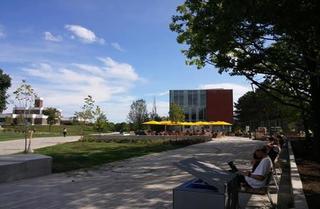Study Avionics and Aeronautical Engineering abroad
Avionics and Aeronautical Engineering teach skills related to aerospace design, flight management and principles of aviation. Students develop core competencies such as quick decision-making and analytical skills that are valuable in various positions.
Average annual salary of an aeronautical engineer

$69,280: average annual salary of an avionics technician

8% projected growth in employment opportunities

14,400 openings projected for aircraft and avionics equipment mechanics and technicians each year
About Avionics and Aeronautical Engineering
There are several particular and specialist areas in which a person might excel in Avionics and Aeronautical Engineering. Thermodynamics, celestial mechanics, propulsion, and aerodynamics are among areas in which an aeronautical engineer might concentrate. As a result, aerospace engineering has a broad reach.
Is Avionics and Aeronautical Engineering right for me?
The simplest way to describe the scope of aerospace and avionics engineering is to identify the problem, research possible solutions, and then create a product that is fit for purpose. If you're working in aerospace, the first step is to figure out what the craft needs to do, what kind of budget you're working with, and how much time you'll have to complete it. Naturally, such work calls for problem-solving and analytical skills. If you believe you possess the aforementioned qualities, then this degree might be the right fit for you.
Avionics and Aeronautical Engineering study options and costs

MS in Avionics and Aeronautical Engineering is a one to two-year degree offered in full-time, part-time, and online formats in the US. Because the degree requires a robust understanding of math, physics, and engineering, admission requires a bachelor's degree in mechanical engineering or a related field with strong technical knowledge in the aforementioned subjects. The cost of obtaining an MS in Avionics and Aeronautical Engineering in the US ranges from $15,000 to $56,000.
Future outlook
Career pathways for Avionics and Aeronautical Engineering graduates

Aerospace Engineers
Aerospace engineers are in charge of developing and testing products for the aerospace and space sectors. This position necessitates advanced materials knowledge as well as experience drafting designs for aeroplanes, helicopters, spacecraft, rockets, and other related machines using specialised computer tools.
Flight Engineers
Flight engineers are the most in-demand aerospace engineers since they maintain track of all maintenance pre- and post-flight. They ensure that aircrafts continue to fly without incident. Their primary responsibilities focus on inspections, repairs, and occasionally even fuelling. They also keep an eye out for any signs of deterioration and looming system malfunctions.
Aircraft Engineers
An aircraft engineer's job entails applying scientific and technological principles to the development, design, and research of aircraft and their components. Additionally, design standards for aircraft and related support equipment are researched by aircraft engineers.
提供的獎學金
-
At University of Waterloo

Waterloo , Canada

資格
Bachelor's Degree

資助類別
Fee waiver/discount
-
At University of Waterloo

Waterloo , Canada

資格
Bachelor's Degree

資助類別
Fee waiver/discount
-
At University of Waterloo

Waterloo , Canada

資格
Bachelor's Degree

資助類別
Fee waiver/discount





我們開始吧!
一鍵註冊或登入
檢視清單 或關閉此視窗以繼續搜尋